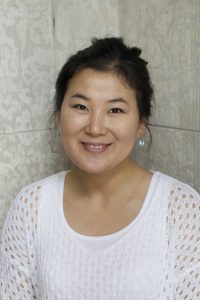CSOP Participant Profile – Hyun Hee Kim

By Beth Downey Sawatzky
On Fear, Perspective and Peace
Hyun Hee Kim, age 32, is a student at Canadian Mennonite University, completing pre-Master's requirements in Peace and Conflict Transformation Studies (PACTS). What you would never guess after an ordinary conversation with her, is that this is in itself is a miracle.
Kim was born in North Korea, fled with her mother and brother to China at age 14, whence they were deported back to North Korea, narrowly escaped firing squad and endured three months in a NK prison camp; when she was 17 the family fled again, living illegally in China until 2004 when they were able to make there way into South Korea with fake documents and gain official citizenship. By this time, Kim was 25; having lived in partial-hiding nearly all her life, she had received no formal education since age 12.*
Kim enrolled with CSOP for relevant degree credit, taking “The Biblical Story of Hope and Healing” with CMU's own Dan Epp-Tiessen, and Al Fuertes' “Psychosocial Trauma Healing.” As to the first, she recounts how Epp-Tiessen framed his course by sharing his own testimony of loss, hope in Christ, and healing:
“I was really impressed by the instructor's story about how he lost his son; he told us 'There is hope, even when you are in a horrible situation,' and hearing about what he had been through, I couldn't imagine being in that situation—but he held on to hope, to God, with prayer and sometimes even lament. It reminded me of my own experience; our time in China…it was very insecure because we stayed illegally, but my brother and I, we cried out to God for help. I am familiar with what it means to cling to hope through fear.”
Unsurprisingly, Kim struggles with “anxiety, that can sometimes be severe,” and frequently receives counselling to help her cope. For her, these two courses have very practical, personal relevance: “It's a very deep feeling and I want to know, where does it come from, this feeling in me? So the word healing in both these courses called to me. This will be, I hope, not just for credit but a healing experience as well, where I can learn from other students and the teachers, and their stories.”
In “Psychosocial Trauma Healing”, Kim says the topic of resilience stood out. “The word resilience, we learned, indicates a person's ability to recover quickly from trauma or stress. I notice that many North Korean defectors, especially women, do not seem very resilient—they seem weak, not like my mother.” It is the first time in a long time this interviewer has heard the adjective “weak” used so utterly without condemnation. Kim's words carry no malice or judgement at all. She says the question that will remain with her coming away from these courses, is one of practical applied compassion:
“As I experienced, although we know there is hope sometimes we are so weak, we are so depressed, so low, so beaten down that we can't even think about hope. We have, for the moment, lost all hope, and feel powerless. I believe it is true everyone has the power to overcome trouble, but when people feel powerless, when they have lost hope, how can we help them build up their strength, their resilience? How do we restore their hope, and encourage them to carry on?”
Asked about recommendations, Kim observes, in what could be a metaphor for so many of us in our daily battles with pain, strife and loss, “When you are in Korea, North or South, it's hard to see different perspectives on life, on peace.” She adds, “I want so many Koreans—North and South Koreans—to take these courses because they can gain such good perspective. [CSOP] is unique, so I would want them to take it.”
* For a more detailed account of Kim's breath-taking testimony, see article “Piecing together her peace” by MCC's Deborah Froese.







